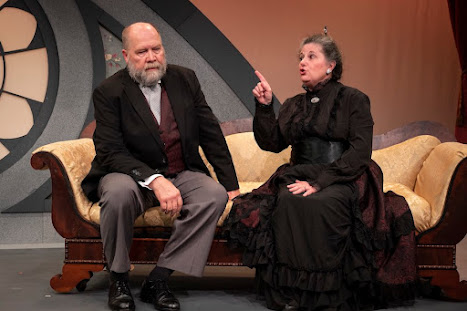Major Barbara, Washington Stage Guild, Washington, DC
Stephen Patrick Martin as Andrew Undershaft and Laura Giannarelli as Lady Britomart. Photo credit: Christopher O. Banks.
A program note from Washington Stage Guild’s artistic director, Bill Largess, explains that the founders wanted the company to be “dedicated to the kind of play we liked best – eloquent plays of idea and argument, passion and wit.” George Bernard Shaw’s Major Barbara certainly embodies all four of those guiding principles. It is given a bold, sure-footed production under the direction of Stephen Carpenter, continuing at the Undercroft Theatre through December 11.
Indeed, it is the ideas and arguments in the play that are
at the forefront. Plot and character are less important, but there is enough
plot in which to hang the ideas and the characters are quirky and interesting
enough to enable us to become engaged in the arguments.
Lady Britomart convenes her young adult son, two daughters,
and the daughters’ current love interests, to announce that their father (her
estranged husband) will be visiting. The time has come for her to ask for more
money to support them, as the son has no skills or job prospects (and who
cannot inherit the family business), nor do her daughters’ suitors: one must
wait several years for his inheritance and the other, Adolphus Cusins, is
something of a vagabond professor of Greek. To her mother’s disappointment, the
older daughter, Barbara, has joined the Salvation Army and attained the rank of
Major. A complicating factor for the family is that, according to tradition,
the company is not to be passed from father to son, but rather left to a
foundling who can learn and take over the operation.
Unbeknownst to the children, the family has been supported
by their absent father, Andrew Undershaft, whose fortune has been made from a
large and successful weapons company, manufacturing all manner of fire arms. Knowledge
of this puts him in direct confrontation with Barbara, who is horrified to
learn that such a “sinful” operation has provided for her and financed her
mission work. Father and daughter agree to look into each other’s world. Does
salvation come through a pseudo-military religion or through more conventional
military means? Is it in spirituality and religion or is it in capitalistic
success?
In Act II, we see Barbara in action dealing with the
destitute and desperate. The mission provides bread, shelter, and safety to the
downtrodden. (Especially effective is the double casting of the actors playing
all of the roles other than Andrew, Barbara, and Adolphus as vastly different
characters at the mission.) While Andrew
is impressed with Barbara’s ways, he is unconvinced by the mission’s promise of
“salvation.” A few days later, in Act III, the whole family visits Andrew’s
weapons factory, where they are impressed by the industrial village and
circumstances in which the workers live and work. Andrew maintains that the
“salvation” he provides the poor, jobs, housing, and dignity, far outweighs the
meager assistance the mission provides.
The relationships are more dynamic than it might appear from
this synopsis, but, again, it is the ideas and argument that are important. Both
are delivered with passion and wit by the assortment of characters. The
polemics are what is most important to Shaw, but the wit is sharp, much of it reminiscent
of Shaw’s contemporary, Oscar Wilde, and the passions of the characters make
the polemics palatable.
The cast is uniformly excellent, deftly handling several
different accents and, as mentioned, several embody two (and even three)
characters.
Stephen Patrick Martin gives Andrew Undershaft the authority
of a man who has supreme confidence in himself and the life he has built. There
are nice moments as he “reacquaints” himself with his children (the character
is uncertain of just how many he has) and as he enjoys endearing, flirty
moments with his wife, even after the years of separation. Martin’s performance
meshes perfectly with that of Laura Giannarelli as Lady Britomart, a
no-nonsense woman of formidable will who does not suffer fools. Giannarelli transforms
surprisingly in Act II, first as Rummy Mitchens, a housewife pretending to be a
fallen woman and seeking aid at the mission, and then as Mrs. Baines, Barbara’s
superior in the Salvation Army, who has no qualms at all about accepting
Undershaft’s donations to keep the mission afloat.
Emelie Faith Thompson is a striking, strong figure as the
titular character, effectively portraying Barbara’s moral dilemma. She is
well-matched by Benjamin Russell as Adolphus Cusins, who accepts Andrew’s
principles after some lively debate.
Marie Claire Lyon as Sarah Undershaft makes a strong
impression, somehow physically “melting” into the furnishings, including perching on a cannon at the weapons factory. She is also cast as Jenny Hill, an
idealistic young member of the Army. Sarah’s beau, Charles Lomax, is played with
excellent comic instincts by Hunter Ringsmith, who also takes on the role of
Snobby Price, a denizen of the mission who has figured out how to work the
system. Justino Brokaw transforms from a rather milquetoast Stephen into Bill
Walker, a fiery ruffian antagonizing and threatening people at the mission, and
then back again. Frank Britton rounds out the cast by appearing as Morrison,
Peter Shirley, and Bilton.
The designs (scenery by Megan Holden, costumes by Maria
Bissex, lighting by Marianne Meadows) assisted in creating the period and
locale. The only misstep to me, visually, was an unfortunate wig choice for
Stephen Undershaft, which drew unhelpful attention to itself.
With this Major Barbara, Washington Stage Guild
certainly accomplished its goal of bringing to its stage a play of “idea and
argument, passion and wit.” No small feat for such a talky play in a time of
diminished attention spans.




Comments
Post a Comment